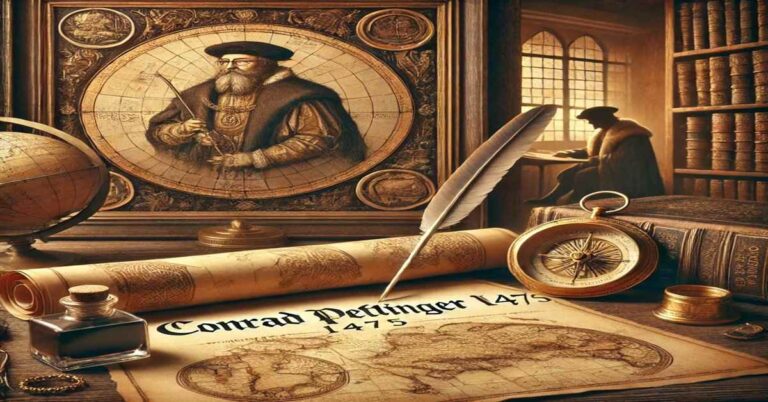In the annals of history, certain individuals emerge as pivotal figures, shaping their era and influencing future generations. One such luminary was Conrad Peutinger II 1475. Born in 1475 in Augsburg, Germany, Peutinger was not only a scholar but also a statesman, humanist, and cartographer. His contributions to the fields of education, politics, and geography have left an indelible mark, making him a subject of enduring interest.
This blog delves into the life and achievements of Conrad Peutinger II 1475, highlighting his influence during the Renaissance period. We’ll explore his multifaceted career, his enduring legacy, and the reasons why he remains a figure of scholarly intrigue.
Early Life and Education
Conrad Peutinger II 1475 was born into a prosperous family in Augsburg, a vibrant city at the crossroads of European trade routes. His upbringing afforded him access to the best education of the time. Peutinger studied law at the University of Padua, one of Europe’s premier institutions, where he was immersed in the humanist traditions of the Renaissance. His education laid the groundwork for his later achievements, blending classical knowledge with contemporary innovations.
Peutinger’s Contributions to Politics and Diplomacy
After completing his studies, Conrad Peutinger II 1475 returned to Augsburg and entered public service. As a trusted advisor to Emperor Maximilian I, Peutinger played a crucial role in diplomacy and governance. His legal expertise and humanist perspective enabled him to navigate complex political landscapes, fostering peace and cooperation among European powers.
During his tenure as a diplomat, Peutinger’s ability to mediate disputes and negotiate treaties earned him widespread respect. His efforts not only strengthened Augsburg’s political standing but also contributed to the broader stability of the Holy Roman Empire.
The Peutinger Map: A Cartographic Masterpiece
One of Peutinger’s most celebrated achievements is the Tabula Peutingeriana, or Peutinger Map. Although the original map predates Peutinger, he acquired and preserved it, recognizing its historical and geographical significance. The map, a Roman road map, spans from Britain to India, offering insights into ancient trade routes and infrastructure.
The Peutinger Map is more than a cartographic artifact; it serves as a testament to Peutinger’s scholarly curiosity and his commitment to preserving knowledge. Scholars continue to study the map for its detailed depiction of the Roman Empire’s vast network, and its influence is evident in modern cartography.
Peutinger as a Humanist and Scholar
Conrad Peutinger II 1475 was a quintessential Renaissance humanist. He championed the revival of classical literature, collecting and preserving manuscripts that might otherwise have been lost. His extensive library became a hub for scholars, fostering intellectual exchange and advancing humanist ideals.
Peutinger’s writings, though less well-known than his cartographic contributions, reflect his deep engagement with classical texts and contemporary issues. His correspondence with leading intellectuals of the time underscores his role as a bridge between ancient wisdom and modern thought.
Legacy and Influence
The legacy of Conrad Peutinger II 1475 extends far beyond his lifetime. His efforts to document and preserve knowledge have had a lasting impact on various fields, from cartography to historical studies. Modern historians and geographers continue to draw upon his work, acknowledging its significance in understanding the ancient world and the Renaissance.
Peutinger’s dedication to humanist principles also set a standard for future generations of scholars and public servants. His life exemplifies the Renaissance ideal of a well-rounded individual, equally adept in academic and practical pursuits.
Lessons from Conrad Peutinger’s Life
Peutinger’s life offers valuable lessons for today’s thinkers and leaders:
- Preserve and Share Knowledge: Peutinger’s efforts to safeguard historical artifacts remind us of the importance of preserving cultural heritage.
- Embrace Interdisciplinary Learning: His diverse interests highlight the benefits of a holistic approach to education and problem-solving.
- Foster Collaboration: Peutinger’s success as a diplomat underscores the value of building bridges between different cultures and perspectives.
Why Study Conrad Peutinger II 1475 Today?
Understanding figures like Conrad Peutinger II 1475 enriches our appreciation of the Renaissance and its enduring impact on modern society. His life and work illustrate the transformative power of knowledge, diplomacy, and cultural exchange. By studying his contributions, we gain insights into the values and innovations that shaped one of history’s most dynamic periods.
Conclusion
Conrad Peutinger II 1475 was a remarkable figure whose influence resonates across centuries. From his political acumen to his scholarly pursuits, Peutinger exemplified the Renaissance spirit of inquiry and innovation. His legacy serves as a reminder of the enduring importance of knowledge, collaboration, and the pursuit of excellence.
Whether you’re a student of history, a geography enthusiast, or simply curious about the Renaissance, the story of Conrad Peutinger II 1475 offers inspiration and insight. Explore his life and achievements, and discover the rich tapestry of ideas that continue to shape our world.
The Slate Team specializes in paid guest posts, promoting quality content and diverse digital perspectives.
